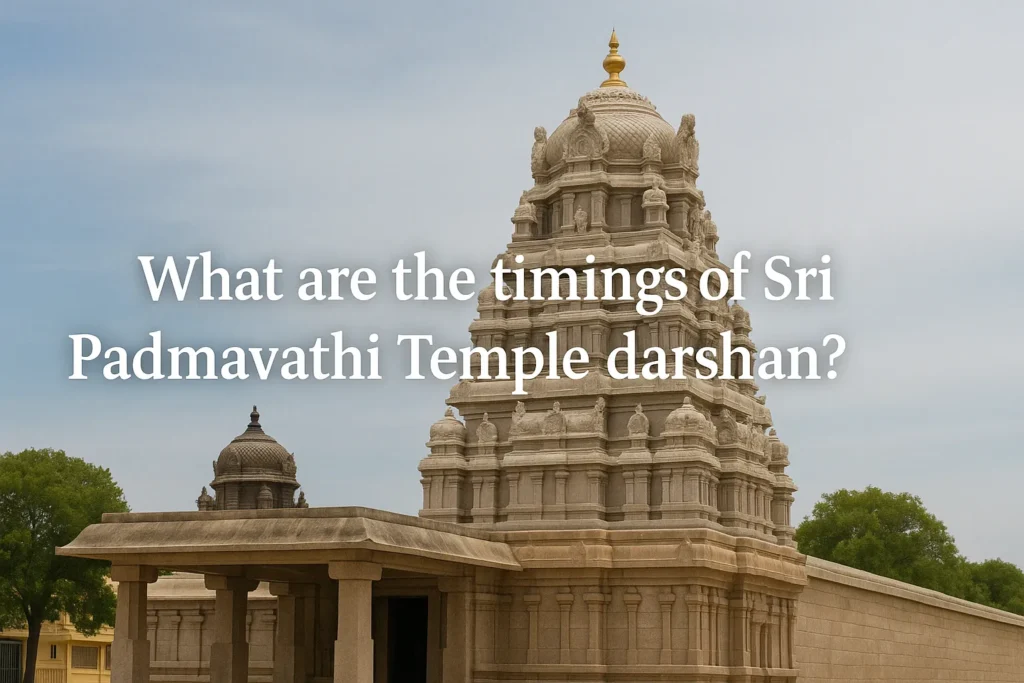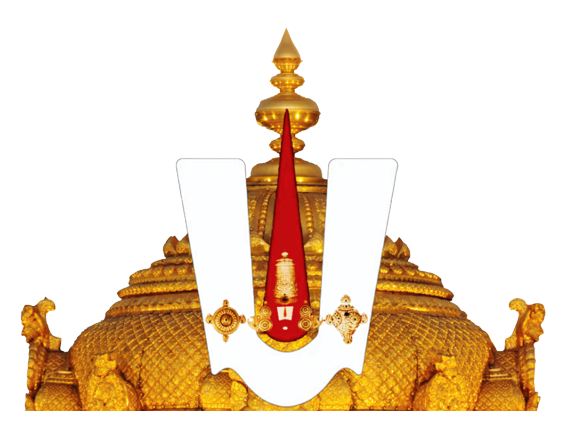Planning to visit Sri Padmavathi Temple in Tiruchanur? Get updated darshan timings, special seva schedules, online booking procedures, and insider tips from experienced pilgrims to maximize your spiritual experience at Goddess Padmavathi’s divine abode.
Sri Padmavathi Ammavari Temple, located in Tiruchanur near Tirupati in Andhra Pradesh, is one of the most revered shrines dedicated to Goddess Padmavathi, the divine consort of Lord Venkateswara. As someone who has visited this sacred temple multiple times over the years, I can attest that understanding the darshan timings and scheduling your visit appropriately can significantly enhance your spiritual experience. In this comprehensive guide, I’ll share detailed information about the Sri Padmavathi Temple darshan timings, special sevas, ticket procedures, and practical tips based on personal experiences and official information from the Tirumala Tirupati Devasthanams (TTD).

Table of Contents
Regular Darshan Timings at Sri Padmavathi Temple
The Sri Padmavathi Ammavari Temple in Tiruchanur follows a structured schedule for darshan (sacred viewing of the deity) that accommodates various rituals throughout the day. The temple remains open for devotees nearly throughout the day, with specific breaks for divine rituals and deity preparations.
Morning Darshan Schedule
The temple opens early in the morning with the divine awakening of the Goddess, followed by various sevas and darshan opportunities:
- 4:30 AM – 5:00 AM: Temple doors open with Suprabhatam (divine awakening)
- 5:00 AM – 6:00 AM: Thomala Seva (decoration with fresh flowers)
- 6:00 AM – 11:30 AM: General darshan for devotees
- 11:30 AM – 12:00 PM: Naivedyam (food offering to the Goddess)
During my visit last summer, I found that arriving around 6:30 AM provided the most serene experience. The morning air was filled with the fragrance of camphor and fresh flowers, and the number of devotees was relatively low compared to later hours. The divine ambiance during these early hours creates a deeply spiritual atmosphere, making it an ideal time for those seeking a more contemplative experience.
Afternoon Darshan Schedule
After the midday rituals, the temple reopens for afternoon darshan:
- 12:00 PM – 1:00 PM: Temple closed for mid-day rituals
- 1:00 PM – 6:00 PM: Afternoon darshan for devotees
The afternoon hours, especially between 2:00 PM and 4:00 PM, typically see fewer crowds on regular days, making it another good time for those who prefer a less crowded darshan experience. However, do note that during festival days or weekends, the temple remains crowded throughout its opening hours.
Evening Darshan Schedule
The evening schedule includes special alankaram (decoration) and rituals:
- 6:00 PM – 6:30 PM: Evening alankaram (special decoration)
- 6:30 PM – 9:00 PM: Evening darshan for devotees
- 9:00 PM – 9:30 PM: Ekanta Seva (final ritual)
- 9:30 PM: Temple closes for the day
The evening darshan has its own charm with the temple beautifully illuminated with traditional lamps and the divine aroma of incense filling the air. During my visits, I’ve found the atmosphere particularly enchanting between 7:00 PM and 8:00 PM when the evening aarti (ritual of lights) is performed.
Special Darshan Categories and Timings
Besides the regular darshan, Sri Padmavathi Temple offers special darshan options for devotees who wish to have a closer and more intimate darshan experience. These special darshans have their own timings and procedures.
Seeghra Darshan (Special Entry)
Seeghra Darshan, also known as Special Entry Darshan, is available for devotees who wish to have a quicker darshan experience without standing in the regular queue:
- Timing: Available during all general darshan hours
- Ticket Cost: ₹50 per person
- Purchase Location: Available at the temple ticket counter or online through the official TTD website
During peak seasons and weekends, Seeghra Darshan can save you considerable time. Based on my experience during the Brahmotsavam festival last year, the regular queue had a waiting time of over 3 hours, while the Seeghra Darshan reduced it to approximately 30 minutes.
VIP Darshan (Protocol)
For senior citizens, differently-abled persons, and other eligible categories, there’s a provision for VIP darshan:
- Timing: Available during all general darshan hours
- Eligibility: Senior citizens above 65 years, differently-abled persons, and other categories as specified by TTD
- Documentation Required: Valid ID proof showing age/disability certificate
The VIP darshan facility ensures that vulnerable groups can have darshan without the physical strain of waiting in long queues. During my visit with my elderly grandmother, we found the staff to be exceptionally helpful in facilitating this service.
Special Sevas and Their Timings at Sri Padmavathi Temple
The temple offers various special sevas (ritual services) that devotees can participate in by purchasing tickets. Each seva has specific timings and procedures.
Arjita Sevas (Paid Ritual Services)
- Abhishekam Seva
- Timing: 5:30 AM – 6:30 AM (performed on specific days)
- Description: Ritual bathing of the deity with milk, honey, curd, etc.
- Ticket Cost: ₹500 per ticket
- Number of Participants: Limited to 10 devotees per session
- Kalyanotsavam
- Timing: 6:00 PM – 7:00 PM (performed on specific days)
- Description: Ceremonial wedding ritual of the Goddess
- Ticket Cost: ₹500 per ticket
- Number of Participants: Limited to 20 devotees per session
- Sahasra Deepalankara Seva
- Timing: 7:00 PM – 8:00 PM (performed on Fridays)
- Description: Illumination of the temple with a thousand lamps
- Ticket Cost: ₹1,000 per ticket
- Number of Participants: Limited to 10 devotees per session
I had the privilege of participating in the Sahasra Deepalankara Seva during a Friday evening visit, and the sight of the temple illuminated with countless lamps created an ethereal atmosphere that was truly divine. The priest conducted the ritual with detailed explanations of its significance, making it a deeply educational and spiritual experience.
Daily Sevas (Free Ritual Services)
Besides the paid sevas, there are daily rituals that all devotees can witness during specific timings:
- Nithya Puja
- Timing: 8:00 AM – 9:00 AM
- Description: Daily worship ritual
- Naivedyam
- Timing: 11:30 AM – 12:00 PM
- Description: Food offering to the deity
- Deepa Aradhana (Aarti)
- Timing: 6:30 PM – 7:00 PM
- Description: Waving of sacred lamps
These daily sevas are open to all devotees present in the temple during these times. The Deepa Aradhana in the evening is particularly beautiful, with the rhythmic chanting of hymns accompanying the waving of lamps.
Festival Days and Special Darshan Timings
During major festivals and auspicious days, Sri Padmavathi Temple follows a modified darshan schedule to accommodate the special rituals and increased devotee footfall. Here are some key festivals and their associated darshan adjustments:
Annual Brahmotsavam
The annual Brahmotsavam at Sri Padmavathi Temple is celebrated with great grandeur, typically in the month of Karthika (October-November) according to the Hindu calendar:
- Festival Duration: 9 days
- Modified Darshan Hours: The temple remains open from 4:00 AM to 11:00 PM throughout the festival
- Special Processions: Various vahana sevas (deity processions on different vehicles) are conducted during morning (8:00 AM – 10:00 AM) and evening (6:00 PM – 8:00 PM)
During my visit during last year’s Brahmotsavam, I observed that despite the extended hours, the crowds were enormous. I would recommend arriving very early (around 4:30 AM) or late in the evening (after 9:00 PM) to have a relatively less crowded darshan experience during this festival.
Padmavathi Kalyanam
The divine wedding ceremony of Goddess Padmavathi with Lord Venkateswara is celebrated with great devotion:
- Celebration Month: Typically in Jyeshta (May-June)
- Special Darshan Timing: The temple follows normal timing, but the main Kalyanam ceremony occurs between 9:00 AM and 12:00 PM
- Ticket Information: Special tickets for witnessing the Kalyanam ceremony are available for ₹500 per person
The Padmavathi Kalyanam ceremony is one of the most auspicious events to witness. Based on my experience, I recommend booking the special tickets well in advance (at least a month prior) as they get sold out quickly.
Fridays and Tuesdays
Fridays and Tuesdays are considered especially auspicious for the worship of goddesses in Hindu tradition. On these days, Sri Padmavathi Temple sees a significant increase in devotee footfall:
- Extended Darshan Hours: On Fridays, the temple sometimes extends evening darshan until 10:00 PM
- Special Alankaram: The Goddess is adorned with special decorations on these days
- Crowd Management: Additional queue lines are arranged to handle the increased number of devotees
From my observations over multiple visits, the waiting time for regular darshan on Fridays can extend to 2-3 hours during peak hours (8:00 AM – 11:00 AM and 6:00 PM – 9:00 PM). Opting for Seeghra Darshan on these days is highly recommended if your schedule allows.
How to Book Darshan Tickets Online
To streamline your visit to Sri Padmavathi Temple, the TTD provides an online booking facility for various darshan options and sevas. Here’s a step-by-step guide on how to book your tickets online:
- Visit the Official TTD Website: Go to the official TTD online services portal
- Create an Account/Login: Register with your details if you’re a first-time user or login with your credentials
- Navigate to Darshan Booking: Select “Tiruchanur – Sri Padmavathi Ammavari Temple” from the temple options
- Select Darshan Type: Choose between regular darshan, Seeghra Darshan, or special sevas
- Choose Date and Time Slot: Select your preferred date and available time slot
- Enter Pilgrim Details: Fill in the required information for all devotees in your group
- Make Payment: Complete the payment using available online payment options
- Download Confirmation: Save or print the confirmation ticket to be presented at the temple
The online booking system implemented by TTD has significantly improved the darshan experience. During my recent visit, I booked the Seeghra Darshan online and was able to bypass the regular queue using the digital confirmation on my smartphone. The staff at the temple were well-trained in verifying digital tickets, making the process smooth and efficient.
Additional Darshan Facilities and Services
To enhance the darshan experience for devotees, Sri Padmavathi Temple offers several additional facilities and services:
Free Darshan for Special Categories
The temple provides free Seeghra Darshan for certain categories of devotees:
- Children below 12 years of age
- Senior citizens above 65 years (with valid ID proof)
- Differently-abled persons (with disability certificate)
- Pregnant women
This thoughtful provision ensures that vulnerable groups can have a comfortable darshan experience without the physical strain of waiting in long queues.
Group Darshan Facilities
For pilgrim groups visiting from various parts of the country, the temple offers special group darshan facilities:
- Minimum Group Size: 20 devotees
- Advance Booking Required: At least 15 days prior to visit
- Contact: TTD Public Relations Officer at Tiruchanur
- Documentation: Letter from recognized religious organization/tour operator
During my visit with a group from our community temple in Bangalore, we availed this facility, and it significantly enhanced our collective spiritual experience. The temple authorities arranged for a guide who explained the temple’s history and rituals, adding educational value to our pilgrimage.
Prasadam Distribution
After darshan, devotees receive the sacred prasadam (consecrated food offering) of the Goddess:
- Regular Prasadam: Talambralu (sacred turmeric rice) and Pulihora (tamarind rice)
- Distribution Points: Available immediately after darshan
- Special Prasadam: Laddu and other special offerings available for purchase separately
The prasadam at Sri Padmavathi Temple has a unique flavor that devotees cherish. I particularly recommend trying the special Pulihora, which has a distinctive taste compared to other temples in the region.
Practical Tips for a Better Darshan Experience
Based on my multiple visits to Sri Padmavathi Temple over the years, here are some practical tips to enhance your darshan experience:
Best Times to Visit
- Weekdays vs. Weekends: Weekdays, especially Monday to Thursday, generally have lower footfall compared to weekends
- Ideal Morning Time: 6:30 AM to 8:00 AM offers a peaceful darshan experience
- Ideal Evening Time: 8:00 PM to 9:00 PM is relatively less crowded on normal days
- Off-Season Months: The months of June-July and January-February typically see fewer pilgrims
During my visit last February, I was pleasantly surprised to find minimal waiting time even for regular darshan. The temple staff mentioned that this is typically one of the least crowded periods of the year.
What to Wear and Bring
- Dress Code: Traditional attire is recommended – sarees or salwar kameez for women, and dhoti or formal pants with shirts for men
- Items to Bring: A small towel, water bottle, and any offerings you wish to make
- Items Not Allowed: Mobile phones, cameras, and electronic gadgets are not permitted inside the sanctum sanctorum
- Footwear: Must be removed before entering the temple complex, with designated storage facilities available
I’ve found that wearing comfortable cotton traditional attire makes the experience more pleasant, especially during the summer months when temperatures can soar. It’s also respectful of the sacred environment.
Transportation and Accommodation
Sri Padmavathi Temple is well-connected to Tirupati and other nearby areas:
- From Tirupati Bus Stand: Regular RTC buses ply between Tirupati and Tiruchanur every 10-15 minutes
- From Tirupati Railway Station: Auto-rickshaws and taxis are readily available
- TTD Free Buses: TTD operates free buses from various points in Tirupati to Tiruchanur
- Accommodation: Several pilgrim accommodations in Tirupati are available at various price points
During my visits, I’ve found the TTD free buses to be exceptionally reliable and convenient. They operate from early morning until late evening, making it easy to plan your darshan according to your preferred timing.
Combining with Lord Venkateswara Darshan
Many devotees visit Sri Padmavathi Temple as part of their pilgrimage to Tirumala for Lord Venkateswara’s darshan. Here’s how you can efficiently plan both:
Traditional Pilgrimage Sequence
According to tradition, devotees are encouraged to visit Goddess Padmavathi first before proceeding to Lord Venkateswara at Tirumala:
- Day 1: Arrive in Tirupati and visit Sri Padmavathi Temple in Tiruchanur
- Day 2: Proceed to Tirumala for Lord Venkateswara’s darshan
- Day 3 (Optional): Visit other nearby temples such as Sri Govindaraja Swamy Temple in Tirupati
This sequence is based on the belief that devotees should seek the blessing of the Mother Goddess before approaching Lord Venkateswara.
Practical One-Day Itinerary
For those with time constraints, here’s a practical one-day itinerary to visit both temples:
- 5:00 AM – 8:00 AM: Visit Sri Padmavathi Temple for morning darshan
- 9:00 AM – 10:00 AM: Travel to Tirumala (approximately 22 km from Tiruchanur)
- 10:00 AM onwards: Lord Venkateswara darshan at Tirumala (with Seeghra Darshan or Special Entry tickets)
This schedule works best if you have pre-booked special entry tickets for Tirumala to avoid the long waiting times.
Recent Updates and Changes to Darshan Timings
The temple administration occasionally updates the darshan timings and procedures based on various factors including festival schedules, renovation works, and special circumstances. Here are some recent updates:
COVID-19 Protocol Adjustments
Following the COVID-19 pandemic, certain changes were implemented:
- Regulated Entry: Limited number of devotees allowed per hour
- Mask Requirement: Mandatory wearing of masks inside the temple premises
- Sanitization Breaks: Additional short breaks for sanitization of temple premises
While many of these restrictions have been eased, some protocols like sanitization breaks are still maintained for public health safety.
Online Booking System Enhancements
The TTD has recently enhanced its online booking system with several user-friendly features:
- Mobile App Integration: New TTD mobile app allows easier booking and management of darshan tickets
- Real-Time Crowd Updates: The online portal now provides real-time updates on current crowd status
- Rescheduling Option: Limited facility to reschedule darshan timings in case of unavoidable circumstances
These technology-driven enhancements have significantly improved the planning experience for devotees. The real-time crowd updates feature, in particular, has been incredibly helpful in deciding the best time to visit.
The Sri Padmavathi Temple darshan experience is a blend of deep spirituality, ancient rituals, and efficient modern management. Understanding the various darshan timings, special sevas, and practical considerations can help devotees plan their visit to maximize the spiritual benefits while minimizing logistical challenges.
Whether you’re visiting for a quick darshan or participating in elaborate sevas, Goddess Padmavathi’s divine grace welcomes all devotees with equal compassion. The temple’s well-organized darshan system ensures that pilgrims from all walks of life can have a meaningful spiritual experience according to their preferences and constraints.
As someone who has visited the temple multiple times across different seasons and occasions, I can attest that each visit offers a unique experience, yet the divine presence of Ammavaru (Mother Goddess) remains a constant source of spiritual solace and blessing. May your visit to Sri Padmavathi Temple be filled with divine grace and inner peace!
About the Author:
Smt. Rajeshwari Balaji is a dedicated traveler and Tirumala devotee with over 20 years of experience in organizing pilgrimages for families. Known for her practical advice and heartfelt narratives, she specializes in guiding first-time visitors through their spiritual journey. Her articles focus on everything from booking darshan tickets to finding comfortable accommodations and experiencing the sanctity of Tirumala. With personal anecdotes and detailed guides, she ensures readers have a smooth and fulfilling pilgrimage experience.
Email: [email protected]

